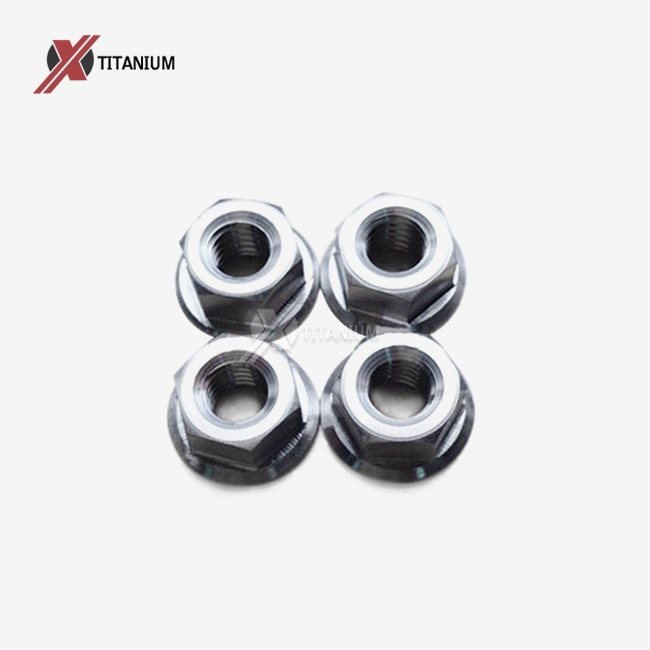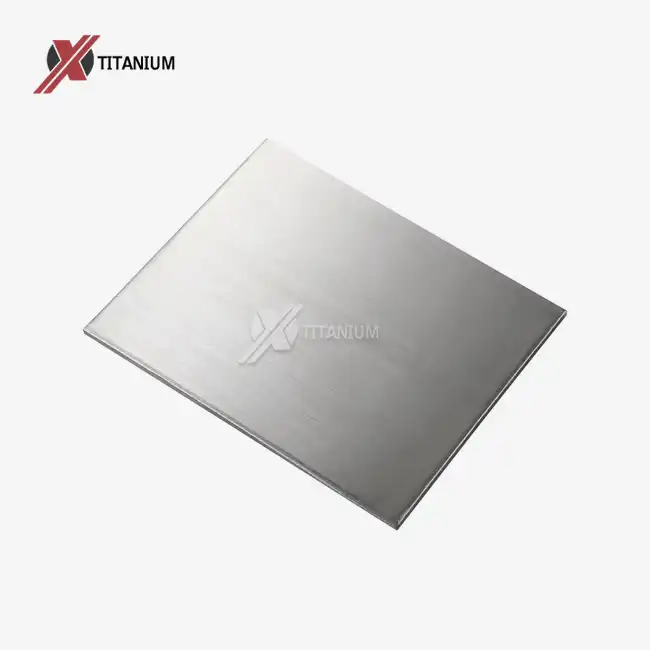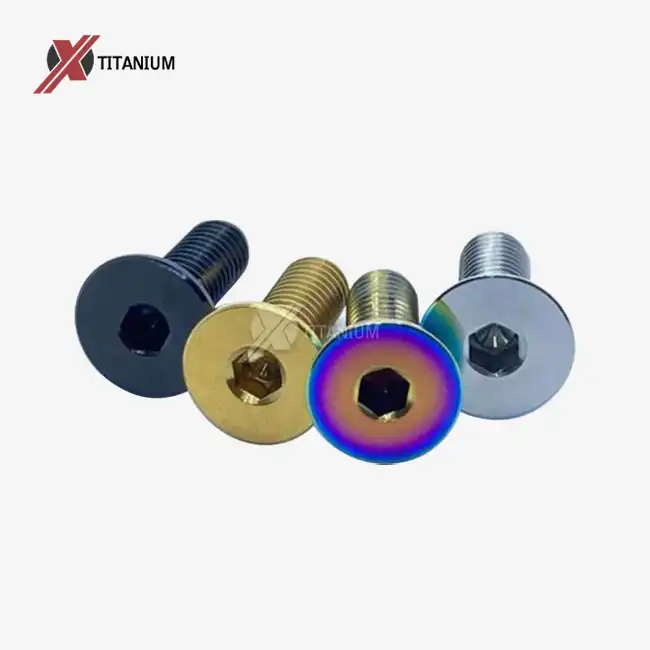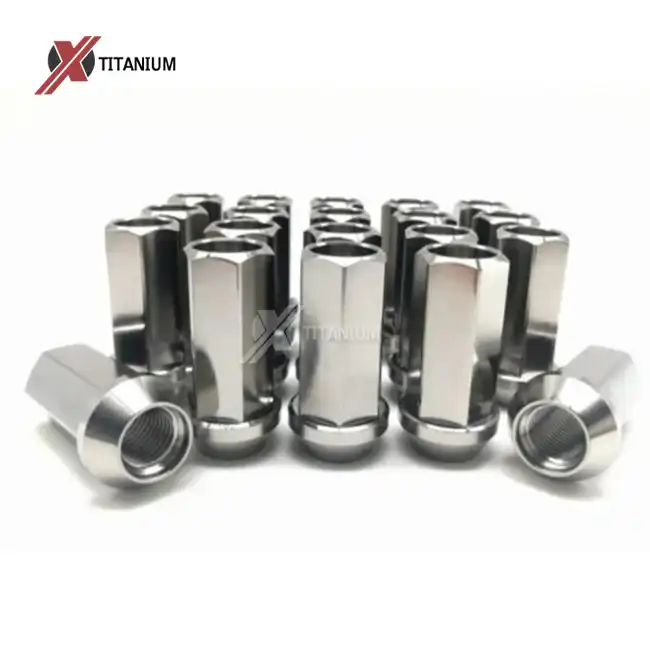Material Properties and Performance Characteristics
Strength and Weight Considerations
Titanium flange nuts boast an impressive strength-to-weight ratio, offering robust performance while significantly reducing overall weight. This characteristic makes titanium nuts particularly valuable in aerospace and automotive industries, where every gram counts. The density of titanium is approximately 4.5 g/cm³, compared to stainless steel's 8.0 g/cm³, translating to a weight reduction of nearly 45% for the same volume.
Stainless steel flange nuts, while heavier, exhibit excellent tensile strength and hardness. They're capable of withstanding high loads and are less prone to galling, a form of wear caused by adhesion between sliding surfaces. This makes stainless steel nuts suitable for applications requiring frequent assembly and disassembly.
Corrosion Resistance and Environmental Factors
Titanium's natural oxide layer provides exceptional resistance to corrosion, even in harsh environments containing chlorides, sulfides, and other corrosive substances. This inherent protection makes titanium flange nuts ideal for marine applications, chemical processing plants, and offshore oil rigs. They maintain their integrity in environments where stainless steel might succumb to pitting or crevice corrosion.
Stainless steel, particularly grades like 316 and 904L, also offers good corrosion resistance, especially against atmospheric corrosion and many chemicals. However, they may be susceptible to stress corrosion cracking in certain environments, particularly those with high chloride concentrations.
Temperature Performance and Thermal Expansion
Titanium flange nuts maintain their strength and structural integrity across a wide temperature range, from cryogenic temperatures to over 500°C (932°F). This stability makes them suitable for extreme environment applications, such as aerospace components or deep-sea exploration equipment.
Stainless steel nuts generally perform well at both low and high temperatures, but their strength can degrade more quickly at elevated temperatures compared to titanium. The thermal expansion coefficient of stainless steel is also higher than that of titanium, which can be a critical factor in applications where thermal cycling is frequent.
Application-Specific Considerations
Aerospace and Aviation
In aerospace applications, the lightweight nature of titanium flange nuts provides a significant advantage. Every kilogram saved in aircraft construction translates to fuel savings and increased payload capacity over the lifespan of the aircraft. Titanium's high strength-to-weight ratio ensures that these nuts can withstand the extreme forces and vibrations experienced during flight without adding unnecessary weight.
Stainless steel nuts, while less common in modern aircraft construction, still find use in less weight-critical areas or in ground support equipment. Their lower cost and ease of manufacture make them suitable for applications where weight is not the primary concern.
Marine and Offshore Industries
The marine environment is notoriously harsh on metal components, with constant exposure to salt water and varying temperatures. Titanium flange nuts excel in this setting, resisting corrosion from seawater and maintaining their structural integrity over long periods. This makes them ideal for use in shipbuilding, offshore platforms, and underwater equipment.
Stainless steel nuts, particularly those made from high-grade alloys like duplex stainless steel, can also perform well in marine environments. However, they may require more frequent inspection and replacement compared to their titanium counterparts, especially in areas with high chloride concentrations or where galvanic corrosion is a concern.
Medical and Biomedical Applications
In the medical field, the biocompatibility of materials is paramount. Titanium flange nuts are highly prized in this sector due to their excellent biocompatibility and low risk of allergic reactions. They're commonly used in medical devices, implants, and surgical instruments where contact with human tissue is possible.
While certain grades of stainless steel are also biocompatible, titanium's lower modulus of elasticity makes it more compatible with bone, reducing stress shielding in orthopedic implants. Additionally, titanium's ability to osseointegrate – directly bond with bone tissue – makes it superior for long-term implantable devices.
Economic and Practical Considerations
Cost Analysis and Long-Term Value
The initial cost of titanium flange nuts is significantly higher than that of stainless steel alternatives. This price difference can be a deterrent for projects with tight budgets or where the unique properties of titanium are not critical. However, it's essential to consider the total cost of ownership rather than just the upfront expense.
In applications where weight savings translate directly to operational cost reductions (such as in aerospace), or where the longevity and corrosion resistance of titanium prevent frequent replacements (as in marine environments), the higher initial investment in titanium flange nuts can result in substantial long-term savings.
Stainless steel nuts, being more economical, are often the go-to choice for general industrial applications where the extreme properties of titanium are not necessary. Their wide availability and lower cost make them suitable for large-scale projects and applications where frequent replacement is not a significant concern.
Availability and Manufacturing Considerations
Stainless steel flange nuts benefit from widespread availability and established manufacturing processes. This abundance translates to shorter lead times and more flexibility in sourcing, which can be crucial for time-sensitive projects or when rapid replacements are needed.
Titanium flange nuts, while less common, are becoming increasingly available as demand grows in high-performance industries. However, the manufacturing process for titanium components is more complex and energy-intensive, contributing to their higher cost. The specialized equipment and expertise required for titanium machining can also limit the number of suppliers capable of producing high-quality titanium fasteners.
Maintenance and Lifecycle Management
The superior corrosion resistance of titanium flange nuts often results in reduced maintenance requirements and longer service life. In corrosive environments, titanium nuts may outlast stainless steel alternatives by several times, reducing the frequency of inspections, replacements, and associated downtime.
Stainless steel nuts, while generally durable, may require more frequent inspections and potential replacements in harsh environments. However, their lower cost can make this increased maintenance more economically feasible in certain applications, especially where the consequences of failure are less severe.
Conclusion
The choice between titanium flange nuts and stainless steel flange nuts depends on a careful evaluation of the specific application requirements, environmental conditions, and long-term economic considerations. While titanium flange nuts excel in high-performance, corrosive, and weight-sensitive applications, stainless steel remains a versatile and cost-effective option for many industrial uses. For expert guidance on selecting the right flange nuts for your project, or to explore our range of high-quality titanium fasteners, please contact us at info@cltifastener.com or djy6580@aliyun.com. Our team at Baoji Chuanglian New Metal Material Co., Ltd. is ready to assist you in finding the optimal solution for your fastening needs.


_1747726553514.webp)

